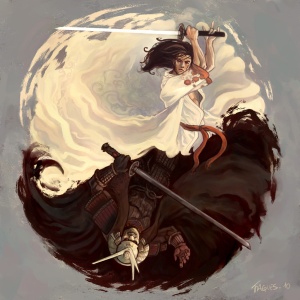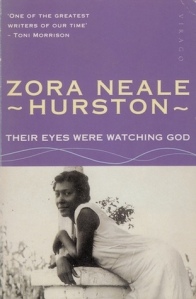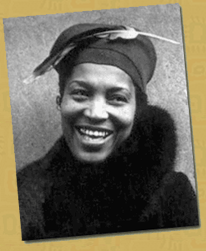Totally brilliant and original, what a voice, a narrative and an insight into a woman’s desire for fulfilment.
 If you have read or were considering reading Marlon James Booker winning A Brief History of Seven Killings, then this is the Yin to his Yang, this is the feminine yearn to his masculine ambition.
If you have read or were considering reading Marlon James Booker winning A Brief History of Seven Killings, then this is the Yin to his Yang, this is the feminine yearn to his masculine ambition.
Immersed in the dynamic culture of the American South, its language, traditions and folklore and equally fascinated by it, Zora Neale Hurston had instant access to a rich depth of stories, songs, incidents, idiomatic phrases and metaphors and an adept ear for the rhythm of speech patterns. With her literary intelligence and skill, she brings it together with remarkable power and beauty to the written page.
Their Eyes were Watching God is an American classic, the esteemed author Toni Morrison called her “One of the greatest writers of our time”, though she may be lesser known beyond those shores. There has been much written about her work and of this particular novel, criticized by feminists at the time of publication, yet come to be more appreciated and understood with time.
Alice Walker’s essay, “In Search of Zora Neale Hurston” revived interest in the author and since then there have been numerous new editions published. It was originally published in 1937.
Zora Neale Hurston tells the story of Janie, a girl raised by her Nanny, who was an ex-slave and therefore wanting to protect her daughter and grand-daughter from the things she feared, which amounted to marriage to a man with land or money or to live under the wings of a good, white family.
 Unable to protect her daughter, who was raped by her schoolteacher, her focus moves to Janie, whom the daughter leaves her with. As soon as adolescence beckons she arranges for her to marry an older farmer with land. Janie dreams of love and fulfilment and when mentions not finding it in this marriage is reprimanded by her grandmother for her romantic notions.
Unable to protect her daughter, who was raped by her schoolteacher, her focus moves to Janie, whom the daughter leaves her with. As soon as adolescence beckons she arranges for her to marry an older farmer with land. Janie dreams of love and fulfilment and when mentions not finding it in this marriage is reprimanded by her grandmother for her romantic notions.
“There are years that ask questions and years that answer.Janie had had no chance to know things, so she had to ask. Did marriage end the cosmic loneliness of the unmated? Did marriage compel love like the sun the day?”
She moves on and marries Joe Sparks who takes her to a new town in Florida, a town built by black people for black people. It isn’t as Joe expects, so he sets about continuing its creation, getting himself elected as mayor and becoming a wealthy man. Janie becomes his showpiece, working in the shop, however he curtails her interactions with the community, thwarting her ability to be herself, even making her cover her hair due to his jealousy.
“She had found a jewel down inside herself and she had wanted to walk where people could see her and gleam it around. But she had been set in the market place to sell. Been set for still-bait. When God had made The Man, he made him out of stuff that sang all the time and glittered all over. Then after that some angels got jealous and chopped him into millions of pieces, but still he glittered and hummed. So they beat him down to nothing but sparks, but each little spark had a shine and a song. So they covered each one over with mud. And the lonesomeness in the sparks made them hunt for one another, but the mud is deaf and dumb. Like all the other tumbling mud-balls, Janie had tried to show her shine.”
Finally, her quest will become fulfilled, though not without its share of life’s ordinary and extraordinary sufferings, when she meets Tea Cake and they manage to ride life’s roller coaster of events and emotions, working together to deal with the demons and living their dream.
“Dis is uh love game. Ah done lived Grandma’s way, now Ah means tuh live mine.”
The excellent afterword of the Virago edition I read, says the following to explain one of the reasons this novel has attributed such notoriety today and why it is that she achieved something so rare.
Black women had been portrayed as characters in numerous novels by blacks and non-blacks. But these portraits were limited by the stereotypical images of, on the one hand, the ham-fisted matriarch, strong and loyal in the defense of the white family she serves (but unable to control or protect her own family without the guidance of some white person), and, on the other, the amoral, instinctual slut. Between these two stereotypes stood the tragic mulatto: too refined and sensitive to live under the repressive conditions endured by ordinary blacks and too coloured to enter the white world.
Even the few idealised portraits of black women evoked these negative stereotypes. The idealisations were morally uplifting and politically laudable, but their literary importance rests upon just that: the correctness of their moral and political stance. Their value lies in their illuminations of the society’s workings and their insights into the ways oppression is institutionalised. They provide, however, few insights into character or consciousness. And when we go (to use Alice Walker’s lovely phrase) in search of our mother’s gardens, it’s not really to learn who trampled on them or how or even why – we usually know that already. Rather, it’s to learn what our mothers planted there, what they thought as they sowed, and how they survived the blighting of so many fruits. Zora Hurston’s life and work present us with insights into just these concerns.” Sherley Anne Williams
Zora Neale Hurston’s depiction of Janie’s life provides a wonderful insight into the character and consciousness of a woman of her era, drawing from her own experience, though the character of Janie has a different personality to Hurston, providing a look not so much into the experiences, but of the yearnings and emotional life of women, their quest for fulfilment and self-discovery and though it’s not without obstacles, allows a little light to shine on those moments where her life does reach that bitter-sweet destination, leaving wisdom in its wake.

Zora Neale Hurston
Zora Neale Hurston (1892-1960) was born in Eatonville, Florida, the first incorporated black town in America. Her life there, nine years of wanderings is described in her book Dust Tracks on the Road. She studied at Howard University and began to write, attracting the attention of the Harlem Renaissance with her essays and short fiction and won a scholarship to Barnard College where she studied Cultural Anthropology, subsequently spending four years researching folklore on the South and publishing another five books including this novel and a collection of tales, songs, games and voodoo practices from the time.

Your first sentence alone is riveting; who could not want to read this book after reading that line?! I have had this on my list, both for the Classics Challenge and for Women’s Literary Challenge, but not yet read it. But the theme of searching for fulfillment is quite an enticing one, so much more interesting than books which have surrounded me of late. (I’ve rather escaped into thrillers, and now need to eacape from them!) Thanks for this post, an excellent reminder to pick this one up.
LikeLiked by 2 people
Thanks for the compliment! I had to go back and reread the first line to remember what I wrote, of course, my first impression upon finishing it, the truest words ever!
I’ve been wanting to read this for ages too, but have been caught up reading translations and a few new releases but last week I had two 5 hour train journeys, Aix to Charleroi in Belgium and decided I was taking Zora Neale Hurston with me, so I could have uninterrupted time reading. The Virago edition was great because of the additional commentary, but the novel stands alone in its brilliance for sure. I definitely recommend it as the perfect literary escape back into the fold and this one ticks both your boxes, a literary classic by a woman. Can’t wait to hear your thoughts on it.
LikeLike
Wonderful review. I read this a few years ago. It’s a powerful novel, with a uniquely rich voice.
LikeLiked by 1 person
Isn’t it! I thought the voice was fabulous and not at all difficult to follow, unlike the Jamaican patois of Marlon James, which at times was pretty hard to comprehend. Hurston’s prose was just fabulous, it reminds me a little of what I love about the woman writer’s from the Caribbean whom I really admire, their is a rhythm to their prose and a wisdom in the years that pass that they portray in literature so deftly. Love it!
LikeLiked by 1 person
Wonderful review, Claire! I first read about Zora Neale Hurston when I read an essay by Zadie Smith about her and this book. I have wanted to read ‘Their Eyes Were Watching God’ ever since. Now after reading your brilliant review, I can’t wait! I loved this passage that you have quoted – “And when we go (to use Alice Walker’s lovely phrase) in search of our mother’s gardens, it’s not really to learn who trampled on them or how or even why – we usually know that already. Rather, it’s to learn what our mothers planted there, what they thought as they sowed, and how they survived the blighting of so many fruits.” So beautiful! Thanks for inspiring me, Claire!
LikeLiked by 1 person
Thank you Vishy, I think Zadie Smith’s essay may be included in one of the editions of the novel, I’d love to read it and Alice Walker’s essay!
Isn’t it a wonderful quote, I had to include it even though it’s so long, because it so succinctly captures the essence of what she was trying to portray. I hope you get to read it soon!
LikeLiked by 1 person
Read this many decades ago and must reconsider re-reading it, thanks to your wonderful review! Zora Neale Hurston was one of my role models as a Renaissance Woman (maybe a pun on the Harlem Renaissance?).
LikeLiked by 1 person
read this long ago and your beautiful review makes me want to read it again.
LikeLiked by 1 person
Funnily enough, one of the members of my book group has just picked this as our next read. (She read the Marlon James last year, so I wonder if there’s a connection in her mind too.) It sounds like a very powerful book with a striking narrative voice. I wonder how the various members of our group will respond to it as we’re quite a mixed bunch with different tastes and preferences. We’ll see…
LikeLiked by 1 person
Oh how serendipitous! I really enjoyed it, and found the dialect easy to follow, but as I say up front, this is the Yin to Marlon James Yang, a timeless classic and an enjoyable read. I hope you review it and mention how your group find it, fascinating! I’m glad I’m not the only one not to have read it, but then I’m not sure its as widely studied outside the US.
LikeLike
This is a wonderful book. I lent my old Virago copy to a work colleague over ten years ago and never got it back. I’ve retired now so I guess I never will his but how I miss it. Such a significant read and one I’ve never forgotten. Maybe I should get my reading group to read it… I’m going to put it on next year’s suggestion list
LikeLiked by 1 person
I came to know of this book earlier this year and noted it as one that I ought to read …. sometime, one day, eventually – which probably would have meant never. Thanks to your wonderful review I know I can’t afford to let this book pass me by. It’s definitely on my list for next year. Thanks, Claire!
LikeLiked by 1 person
It’s funny how it’s an old classic but that it seems to have been suggested by some bookclubs this year and others are considering it. I was quite astounded at how it really answered the question I asked myself over Marlon James novel that I read this summer, what would a female version be like? This novel predates his of course, and I’m certain it may have inspired him, I’m sure he will have read it, it is indeed a wonderful example of what is possible if a woman were to immerse herself in a culture and dialect and narrate her story of searching for fulfilment. Prize worthy definitely!
LikeLike
Wonderful review, Claire. Heard so much about this book. A must read for me now. 🙂
LikeLiked by 1 person
Pingback: Top Reads 2016 – Word by Word
Pingback: Top Five Uplifting Fiction #StayAtHome – Word by Word
Pingback: Top Five Uplifting Fiction – Word by Word
Pingback: Passing by Nella Larsen (1929) – Word by Word